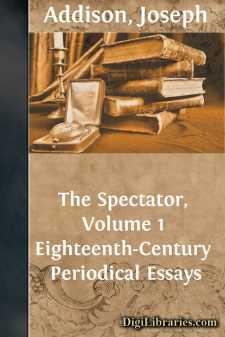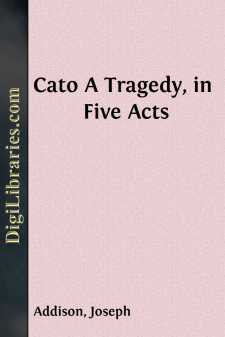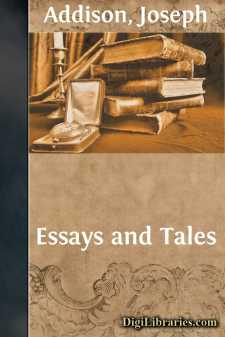Categories
- Antiques & Collectibles 13
- Architecture 36
- Art 48
- Bibles 22
- Biography & Autobiography 813
- Body, Mind & Spirit 142
- Business & Economics 28
- Children's Books 17
- Children's Fiction 14
- Computers 4
- Cooking 94
- Crafts & Hobbies 4
- Drama 346
- Education 46
- Family & Relationships 57
- Fiction 11829
- Games 19
- Gardening 17
- Health & Fitness 34
- History 1377
- House & Home 1
- Humor 147
- Juvenile Fiction 1873
- Juvenile Nonfiction 202
- Language Arts & Disciplines 88
- Law 16
- Literary Collections 686
- Literary Criticism 179
- Mathematics 13
- Medical 41
- Music 40
- Nature 179
- Non-Classifiable 1768
- Performing Arts 7
- Periodicals 1453
- Philosophy 64
- Photography 2
- Poetry 896
- Political Science 203
- Psychology 42
- Reference 154
- Religion 513
- Science 126
- Self-Help 84
- Social Science 81
- Sports & Recreation 34
- Study Aids 3
- Technology & Engineering 59
- Transportation 23
- Travel 463
- True Crime 29
Joseph Addison
Joseph Addison (1672–1719) was an English essayist, poet, and playwright, best known for his work as a co-founder of "The Spectator" magazine, which he created alongside Richard Steele. His essays, known for their wit, clarity, and moral insight, were highly influential in shaping 18th-century English literature and thought. Addison also wrote the play "Cato," a tragedy that became a symbol of the Whig political ideals of liberty and republicanism. Additionally, his prose work, "The Campaign," praised the Duke of Marlborough's military successes and cemented Addison's reputation as a leading literary figure of his time.
Author's Books:
Sort by:
by:
Joseph Addison
AN ESSAY UPON WIT. The Inclinations of Men, in this their degenerate State, carry them with great Force to those voluptuous Objects, that please their Appetites and gratify their Senses; and which not only by their early Acquaintance and Familiarity, but as they are adapted to the prevailing Instincts of Nature, are more esteem'd and pursu'd than all other Satisfactions. As those inferior...
more...
by:
Joseph Addison
INTRODUCTION When Richard Steele, in number 555 of his 'Spectator', signed its last paper and named those who had most helped him 'to keep up the spirit of so long and approved a performance,' he gave chief honour to one who had on his page, as in his heart, no name but Friend. This was 'the gentleman of whose assistance I formerly boasted in the Preface and concluding Leaf of...
more...
by:
Joseph Addison
REMARKS. The author of this tragedy, to whose vigorous mind the English are indebted for their choicest moral works, came into the world with a frame so weak, that he was christened immediately on his birth, in consequence of the symptoms he gave of a speedy dissolution. The hand which reared him did a more than ordinary service to the age in which he lived, and to succeeding generations....
more...
by:
Joseph Addison
INTRODUCTION. The sixty-fourth volume of this Library contains those papers from the Tatler which were especially associated with the imagined character of Isaac Bickerstaff, who was the central figure in that series; and in the twenty-ninth volume there is a similar collection of papers relating to the Spectator Club and Sir Roger de Coverley, who was the central figure in Steele and Addison’s...
more...
by:
Joseph Addison
INTRODUCTION No character in our literature, not even Mr. Pickwick, has more endeared himself to successive generations of readers than Addison’s Sir Roger de Coverley: there are many figures in drama and fiction of whom we feel that they are in a way personal friends of our own, that once introduced to us they remain a permanent part of our little world. It is the abiding glory of Dickens, it is one...
more...






